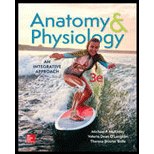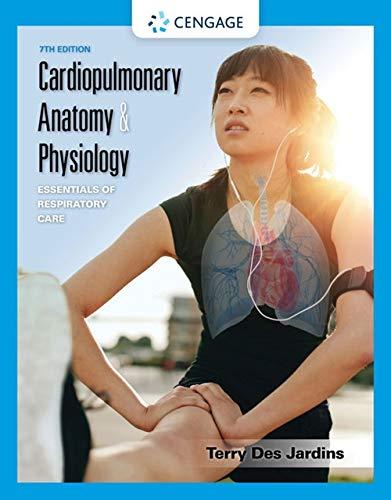
Anatomy & Physiology
3rd Edition
ISBN: 9781259398629
Author: McKinley, Michael P., O'loughlin, Valerie Dean, Bidle, Theresa Stouter
Publisher: Mcgraw Hill Education,
expand_more
expand_more
format_list_bulleted
Textbook Question
Chapter 23, Problem 6DYB
Which areas of the brain contain the respiratory center?
- a. medulla oblongata and hypothalamus
- b. hypothalamus and pons
- c. medulla oblongata and pons
- d. medulla oblongata and cerebrum
Expert Solution & Answer
Want to see the full answer?
Check out a sample textbook solution
Students have asked these similar questions
Ch.23
How is Salmonella able to cross from the intestines into the blood?
A. it is so small that it can squeeze between intestinal cells
B. it secretes a toxin that induces its uptake into intestinal epithelial cells
C. it secretes enzymes that create perforations in the intestine
D. it can get into the blood only if the bacteria are deposited directly there, that is, through a puncture
—
Which virus is associated with liver cancer?
A. hepatitis A
B. hepatitis B
C. hepatitis C
D. both hepatitis B and C
—
explain your answer thoroughly
Ch.21
What causes patients infected with the yellow fever virus to turn yellow (jaundice)?
A. low blood pressure and anemia
B. excess leukocytes
C. alteration of skin pigments
D. liver damage in final stage of disease
—
What is the advantage for malarial parasites to grow and replicate in red blood cells?
A. able to spread quickly
B. able to avoid immune detection
C. low oxygen environment for growth
D. cooler area of the body for growth
—
Which microbe does not live part of its lifecycle outside humans?
A. Toxoplasma gondii
B. Cytomegalovirus
C. Francisella tularensis
D. Plasmodium falciparum
—
explain your answer thoroughly
Ch.22
Streptococcus pneumoniae has a capsule to protect it from killing by alveolar macrophages, which kill bacteria by…
A. cytokines
B. antibodies
C. complement
D. phagocytosis
—
What fact about the influenza virus allows the dramatic antigenic shift that generates novel strains?
A. very large size
B. enveloped
C. segmented genome
D. over 100 genes
—
explain your answer thoroughly
Chapter 23 Solutions
Anatomy & Physiology
Ch. 23.1 - Prob. 1LOCh. 23.1 - Which respiratory structure is associated with the...Ch. 23.1 - Prob. 2LOCh. 23.1 - Prob. 2WDLCh. 23.1 - LEARNING OBJECTIVE
3. Describe the structure of...Ch. 23.1 - Prob. 4LOCh. 23.1 - In what ways does the epithelium of the upper...Ch. 23.2 - Prob. 5LOCh. 23.2 - Prob. 6LOCh. 23.2 - Prob. 1WDT
Ch. 23.2 - What changes occur to inhaled air as it passes...Ch. 23.2 - What is the function of nasal conchae?Ch. 23.2 - Prob. 7LOCh. 23.2 - How are the paranasal sinuses connected to the...Ch. 23.2 - Prob. 8LOCh. 23.2 - What two regions of the pharynx contain tonsils?...Ch. 23.3 - LEARNING OBJECTIVE
9. Describe the general...Ch. 23.3 - Prob. 10LOCh. 23.3 - How does the larynx assist in increasing abdominal...Ch. 23.3 - What are the three unpaired cartilages in the...Ch. 23.3 - Prob. 10WDLCh. 23.3 - Prob. 11LOCh. 23.3 - Prob. 12LOCh. 23.3 - Prob. 2WDTCh. 23.3 - What is the function of the C-shaped tracheal...Ch. 23.3 - LEARNING OBJECTIVE
13. Describe the structural...Ch. 23.3 - Prob. 14LOCh. 23.3 - What are the significant structural differences...Ch. 23.3 - Prob. 15LOCh. 23.3 - LEARNING OBJECTIVE
16. List three types of cells...Ch. 23.3 - Which of the following respiratory structures are...Ch. 23.3 - The respiratory tract can be damaged from...Ch. 23.3 - List the conducting and respiratory structures (in...Ch. 23.3 - Prob. 17LOCh. 23.3 - List, in order, the structures of the respiratory...Ch. 23.4 - Prob. 18LOCh. 23.4 - Prob. 19LOCh. 23.4 - Match the component of the ling with its air...Ch. 23.4 - Prob. 20LOCh. 23.4 - Prob. 21LOCh. 23.4 - Prob. 18WDLCh. 23.4 - Prob. 22LOCh. 23.4 - Prob. 23LOCh. 23.4 - What is the function of serous fluid within the...Ch. 23.4 - LEARNING OBJECTIVE
24. Explain the anatomic...Ch. 23.4 - Why is the intrapleural pressure normally lower...Ch. 23.5 - Prob. 25LOCh. 23.5 - Prob. 21WDLCh. 23.5 - LEARNING OBJECTIVE
26. Explain how pressure...Ch. 23.5 - Prob. 27LOCh. 23.5 - Prob. 28LOCh. 23.5 - Describe the sequence of events of quiet...Ch. 23.5 - How are larger amounts of air moved between the...Ch. 23.5 - Prob. 29LOCh. 23.5 - Prob. 30LOCh. 23.5 - LEARNING OBJECTIVE
31. Explain the different...Ch. 23.5 - Prob. 32LOCh. 23.5 - Prob. 3WDTCh. 23.5 - Prob. 24WDLCh. 23.5 - Which of the following stimuli will cause an...Ch. 23.5 - Are the skeletal muscles of breathing innervated...Ch. 23.5 - Prob. 33LOCh. 23.5 - Prob. 34LOCh. 23.5 - Prob. 4WDTCh. 23.5 - The two factors that determine airflow are the...Ch. 23.5 - Prob. 35LOCh. 23.5 - Prob. 36LOCh. 23.5 - Prob. 5WDTCh. 23.5 - A person in yoga class is encouraged to take long,...Ch. 23.5 - Prob. 37LOCh. 23.5 - Prob. 38LOCh. 23.5 - Prob. 39LOCh. 23.5 - Prob. 29WDLCh. 23.6 - Prob. 40LOCh. 23.6 - Prob. 41LOCh. 23.6 - Prob. 42LOCh. 23.6 - Given the same partial pressure for oxygen and...Ch. 23.6 - LEARNING OBJECTIVE
43. Describe alveolar gas...Ch. 23.6 - Prob. 44LOCh. 23.6 - Prob. 45LOCh. 23.6 - How do the partial pressures of oxygen and carbon...Ch. 23.6 - Prob. 32WDLCh. 23.6 - Prob. 46LOCh. 23.6 - Prob. 47LOCh. 23.6 - Prob. 6WDTCh. 23.6 - How do the partial pressures of oxygen and carbon...Ch. 23.7 - Prob. 48LOCh. 23.7 - Why is such a small percentage (about 2%) of...Ch. 23.7 - Prob. 49LOCh. 23.7 - Prob. 50LOCh. 23.7 - How is the majority of carbon dioxide transported...Ch. 23.7 - Prob. 51LOCh. 23.7 - Prob. 52LOCh. 23.7 - Prob. 7WDTCh. 23.7 - Prob. 8WDTCh. 23.7 - How does oxygen movement occur during alveolar gas...Ch. 23.7 - How does carbon dioxide movement occur during...Ch. 23.7 - Does hemoglobin saturation increase or decrease...Ch. 23.7 - How is oxygen release from hemoglobin during...Ch. 23.8 - Prob. 53LOCh. 23.8 - Prob. 54LOCh. 23.8 - How does blood PO2 and PCO2 change if an...Ch. 23.8 - Prob. 55LOCh. 23.8 - Prob. 9WDTCh. 23.8 - How does blood PO2 and PCO2 change during...Ch. 23.8 - Prob. 42WDLCh. 23 - Prob. 1DYBCh. 23 - Prob. 2DYBCh. 23 - Prob. 3DYBCh. 23 - Prob. 4DYBCh. 23 - Prob. 5DYBCh. 23 - Which areas of the brain contain the respiratory...Ch. 23 - Prob. 7DYBCh. 23 - Prob. 8DYBCh. 23 - Prob. 9DYBCh. 23 - Prob. 10DYBCh. 23 - Explain how the respiratory tract is organized...Ch. 23 - Describe the relationship of the visceral pleura,...Ch. 23 - List the four processes of respiration, in order,...Ch. 23 - Describe the muscles, volume changes, and pressure...Ch. 23 - Explain how additional air is moved during a...Ch. 23 - Describe bow quiet breathing is controlled by the...Ch. 23 - Explain alveolar and systemic gas exchange.Ch. 23 - List the two means by which oxygen is transported...Ch. 23 - Describe the relationship of PCO2 and hemoglobin...Ch. 23 - List the variables that increase the release of...Ch. 23 - Paramedics arrived at a car accident to find an...Ch. 23 - Use the following to answer questions 24....Ch. 23 - Use the following to answer questions 24....Ch. 23 - Use the following to answer questions 24....Ch. 23 - Prob. 5CALCh. 23 - Prob. 1CSLCh. 23 - The nerve to the sternocleidomastoid muscle was...Ch. 23 - Prob. 3CSL
Knowledge Booster
Learn more about
Need a deep-dive on the concept behind this application? Look no further. Learn more about this topic, biology and related others by exploring similar questions and additional content below.Similar questions
- What is this?arrow_forwardMolecular Biology A-C components of the question are corresponding to attached image labeled 1. D component of the question is corresponding to attached image labeled 2. For a eukaryotic mRNA, the sequences is as follows where AUGrepresents the start codon, the yellow is the Kozak sequence and (XXX) just represents any codonfor an amino acid (no stop codons here). G-cap and polyA tail are not shown A. How long is the peptide produced?B. What is the function (a sentence) of the UAA highlighted in blue?C. If the sequence highlighted in blue were changed from UAA to UAG, how would that affecttranslation? D. (1) The sequence highlighted in yellow above is moved to a new position indicated below. Howwould that affect translation? (2) How long would be the protein produced from this new mRNA? Thank youarrow_forwardMolecular Biology Question Explain why the cell doesn’t need 61 tRNAs (one for each codon). Please help. Thank youarrow_forward
- Molecular Biology You discover a disease causing mutation (indicated by the arrow) that alters splicing of its mRNA. This mutation (a base substitution in the splicing sequence) eliminates a 3’ splice site resulting in the inclusion of the second intron (I2) in the final mRNA. We are going to pretend that this intron is short having only 15 nucleotides (most introns are much longer so this is just to make things simple) with the following sequence shown below in bold. The ( ) indicate the reading frames in the exons; the included intron 2 sequences are in bold. A. Would you expected this change to be harmful? ExplainB. If you were to do gene therapy to fix this problem, briefly explain what type of gene therapy youwould use to correct this. Please help. Thank youarrow_forwardMolecular Biology Question Please help. Thank you Explain what is meant by the term “defective virus.” Explain how a defective virus is able to replicate.arrow_forwardMolecular Biology Explain why changing the codon GGG to GGA should not be harmful. Please help . Thank youarrow_forward
- Stage Percent Time in Hours Interphase .60 14.4 Prophase .20 4.8 Metaphase .10 2.4 Anaphase .06 1.44 Telophase .03 .72 Cytukinesis .01 .24 Can you summarize the results in the chart and explain which phases are faster and why the slower ones are slow?arrow_forwardCan you circle a cell in the different stages of mitosis? 1.prophase 2.metaphase 3.anaphase 4.telophase 5.cytokinesisarrow_forwardWhich microbe does not live part of its lifecycle outside humans? A. Toxoplasma gondii B. Cytomegalovirus C. Francisella tularensis D. Plasmodium falciparum explain your answer thoroughly.arrow_forward
- Select all of the following that the ablation (knockout) or ectopoic expression (gain of function) of Hox can contribute to. Another set of wings in the fruit fly, duplication of fingernails, ectopic ears in mice, excess feathers in duck/quail chimeras, and homeosis of segment 2 to jaw in Hox2a mutantsarrow_forwardSelect all of the following that changes in the MC1R gene can lead to: Changes in spots/stripes in lizards, changes in coat coloration in mice, ectopic ear formation in Siberian hamsters, and red hair in humansarrow_forwardPleiotropic genes are genes that (blank) Cause a swapping of organs/structures, are the result of duplicated sets of chromosomes, never produce protein products, and have more than one purpose/functionarrow_forward
arrow_back_ios
SEE MORE QUESTIONS
arrow_forward_ios
Recommended textbooks for you

 Cardiopulmonary Anatomy & PhysiologyBiologyISBN:9781337794909Author:Des Jardins, Terry.Publisher:Cengage Learning,
Cardiopulmonary Anatomy & PhysiologyBiologyISBN:9781337794909Author:Des Jardins, Terry.Publisher:Cengage Learning,- Basic Clinical Lab Competencies for Respiratory C...NursingISBN:9781285244662Author:WhitePublisher:Cengage



Cardiopulmonary Anatomy & Physiology
Biology
ISBN:9781337794909
Author:Des Jardins, Terry.
Publisher:Cengage Learning,


Basic Clinical Lab Competencies for Respiratory C...
Nursing
ISBN:9781285244662
Author:White
Publisher:Cengage

Respiratory System; Author: Amoeba Sisters;https://www.youtube.com/watch?v=v_j-LD2YEqg;License: Standard youtube license